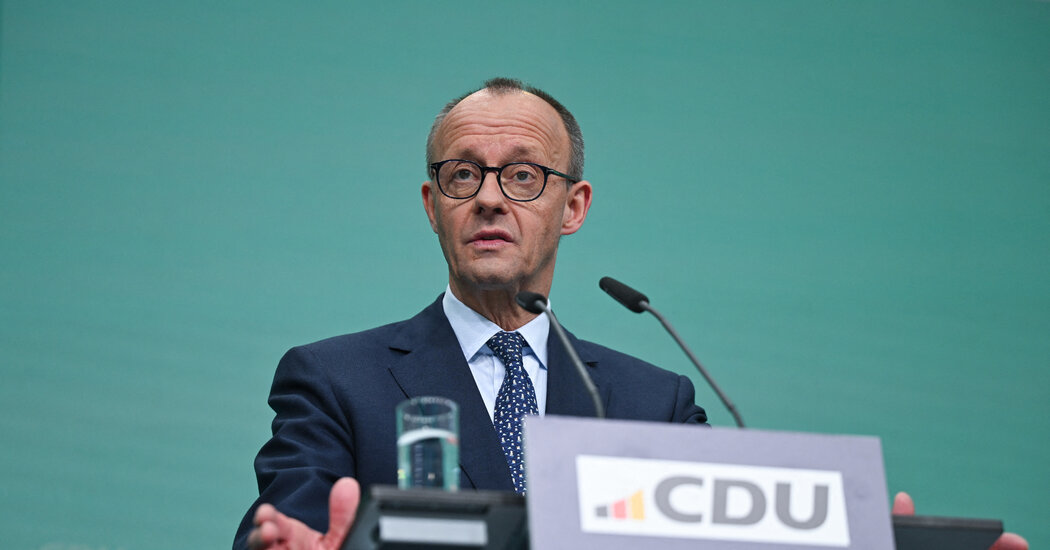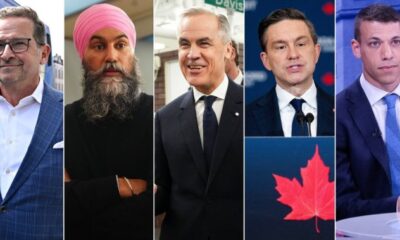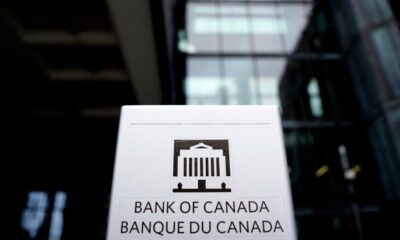Breaking News
What Germany’s Election Result Means for Its Economy

Friedrich Merz and his center-right Christian Democrats emerged victorious in Germany’s election on Sunday, but the celebrations may be short. The next government, almost certainly led by Mr. Merz as chancellor, faces a stagnant economy, President Trump’s threat to put tariffs on the country’s crucial export industries and a fourth year of war in Ukraine.
What’s more, the ability to address these issues is hamstrung by strict limits on government debt and deficits, making it difficult to finance higher military spending, update crumbling infrastructure and carry out other initiatives that economists say are crucial to spur growth.
A dispute over this rule, known as the debt brake, brought down the government of Chancellor Olaf Scholz of the center-left Social Democrats, paving the way for Sunday’s early election. But relaxing the rule would require a two-thirds majority in Parliament to amend the Constitution, and the election outcome suggests it would be difficult to muster that much support.
Already on Monday, Mr. Merz was facing calls from other politicians, economists and even the traditionally conservative central bank for the new government to find a way to adjust the spending limits to fit the country’s urgent economic demands.
“In principle,” the Bundesbank wrote in a report on Monday, “it is entirely justifiable to adapt the debt brake’s borrowing limit to changing conditions when the public debt ratio is low.” German government debt is just over 60 percent of gross domestic product, far lower than in countries like Britain, France and the United States, where debt is near or above 100 percent of G.D.P.
But after Sunday’s election, the two-party coalition that Mr. Merz hopes to form between his Christian Democrats, which won 208 seats, and the Social Democrats, with 120, will have to rely on other parties to achieve the two-thirds majority in Parliament necessary to change the Constitution.
Parties on the extremes — Die Linke on the left and the Alternative for Germany, or AfD, on the right — won enough seats to give them a blocking majority in the 630-seat Parliament. That limits the options for the new government, which will inherit a 2025 budget with a hole of 13 billion euros, or $13.6 billion.
Mr. Merz has ruled out cooperating with the AfD. That means he would have to persuade Die Linke, which opposes borrowing, to spend on the military.
The Greens, who came in fourth with 85 seats, offered another solution. On Monday they called for Mr. Merz and the parties of the departing government — the Social Democrats, the Greens and the Free Democrats (which have no seats in the next Parliament) — to push through either a special defense fund or an easing of the debt brake in the 30 days the current Parliament has left to pass legislation.
Mr. Merz refused to comment on the suggestion, but he indicated a general openness to considering such a move, pointing out that Parliament in the past had used the window immediately after an election to pass laws involving military missions abroad.
“Our deliberations are not yet over,” Mr. Merz said, adding that the German military would need “a lot more money.”
But several economists who support the initiatives have questioned the timing and the democratic legitimacy of such a move. That includes Jörg Kukies, the departing finance minister, who is a Social Democrat.
“First of all, there’s far too little time, and second, it would also be a questionable political signal if constitutional amendments were now made with an old majority,” Mr. Kukies told Reuters.
Beyond relaxing the debt brake, the new government needs to respond to calls from business leaders to help Germany compete against a growing threat from Chinese rivals in markets that German firms once dominated, including cars and machinery, and to navigate the threat of new tariffs from the Trump administration.
“Business expects a stable government and a genuine economic turnaround,” BDI, a powerful industrial lobby organization, said in a statement on Monday. “Isolated corrections and improvements no longer do justice to the seriousness of the situation; instead, policy must focus on strengthening the forces of growth.”
Those forces, according to businesses, economists and others, include lowering the cost of energy, cutting onerous regulations, investing more in infrastructure and speeding up the digitization of public services.
German economic growth has also been hampered by political paralysis and the uncertainty it generates. Nearly a third of voters polled by public television a week before the election said that they preferred Mr. Merz’s party to form a “grand coalition” government with the Social Democrats, reviving the combination that Chancellor Angela Merkel led for 12 of her 16 years in power.
-

 Destination8 months ago
Destination8 months agoSingapore Airlines CEO set to join board of Air India, BA News, BA
-

 Breaking News9 months ago
Breaking News9 months agoCroatia to reintroduce compulsory military draft as regional tensions soar
-

 Tech News11 months ago
Tech News11 months agoBangladeshi police agents accused of selling citizens’ personal information on Telegram
-

 Breaking News9 months ago
Breaking News9 months agoBangladesh crisis: Refaat Ahmed sworn in as Bangladesh’s new chief justice
-

 Productivity11 months ago
Productivity11 months agoHow Your Contact Center Can Become A Customer Engagement Center
-

 Toys11 months ago
Toys11 months ago15 of the Best Trike & Tricycles Mums Recommend
-

 Guides & Tips9 months ago
Guides & Tips9 months agoHave Unlimited Korean Food at MANY Unlimited Topokki!
-

 Gadgets3 months ago
Gadgets3 months agoSupernatural Season 16 Revival News, Cast, Plot and Release Date
























